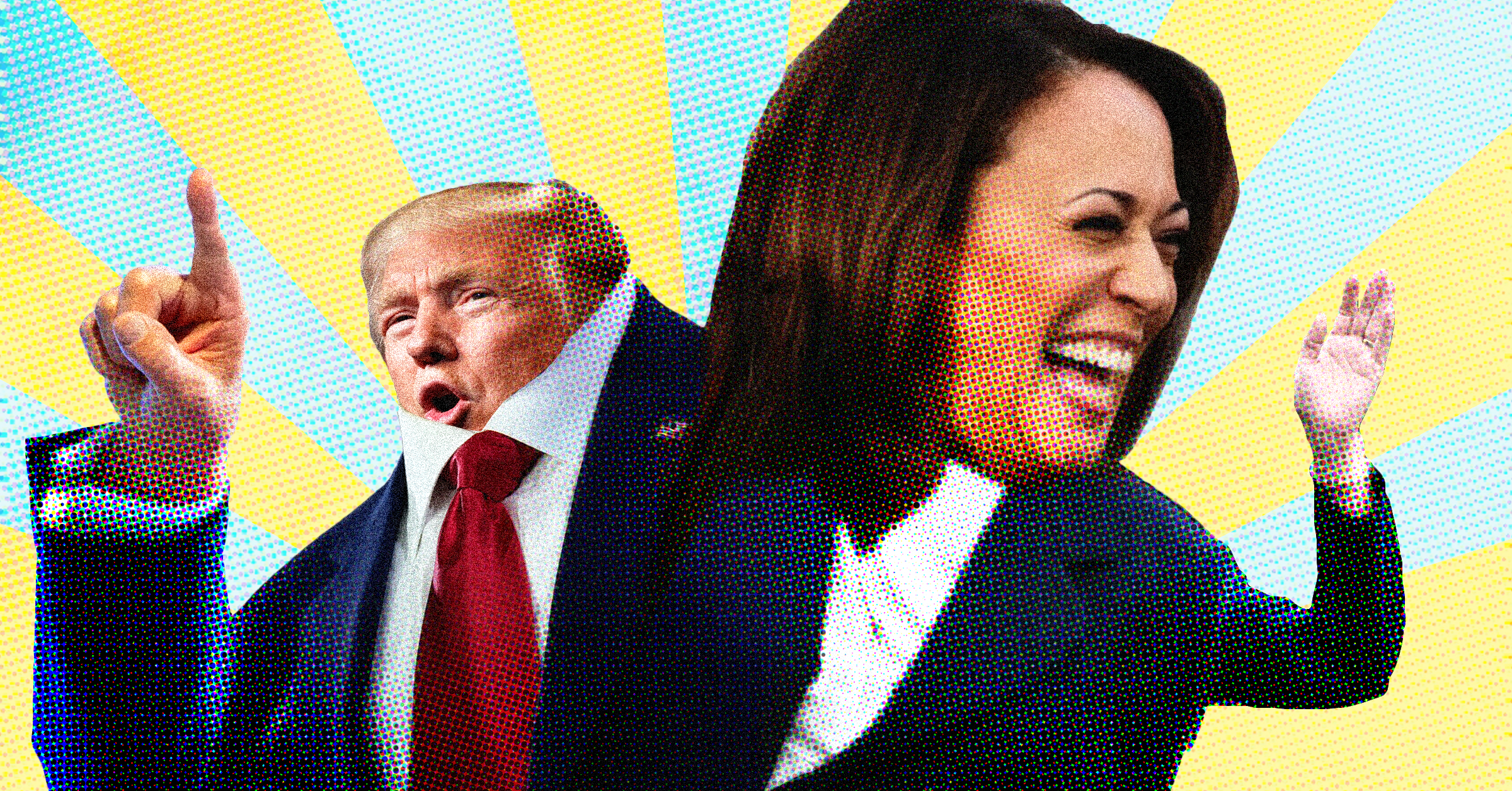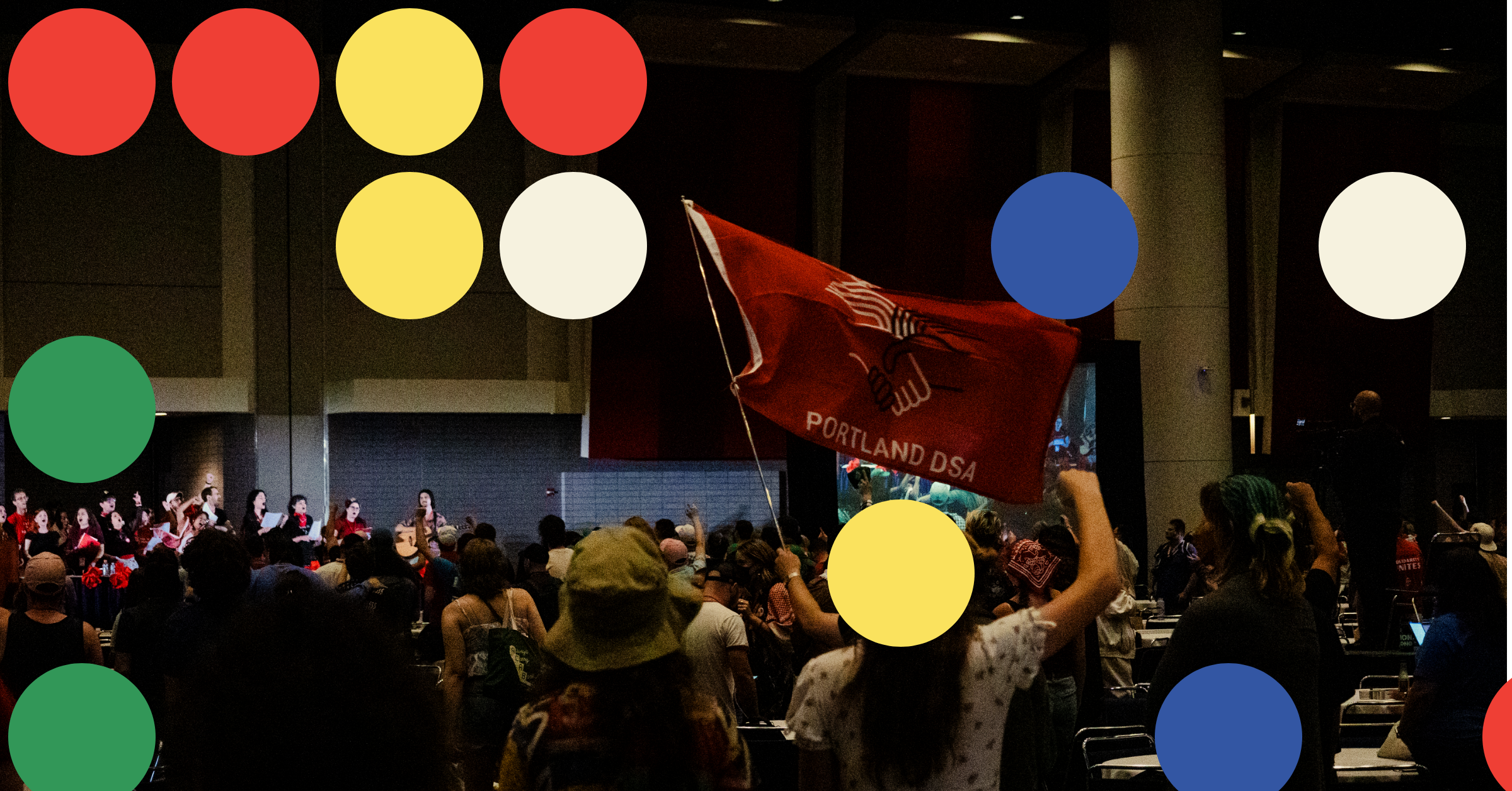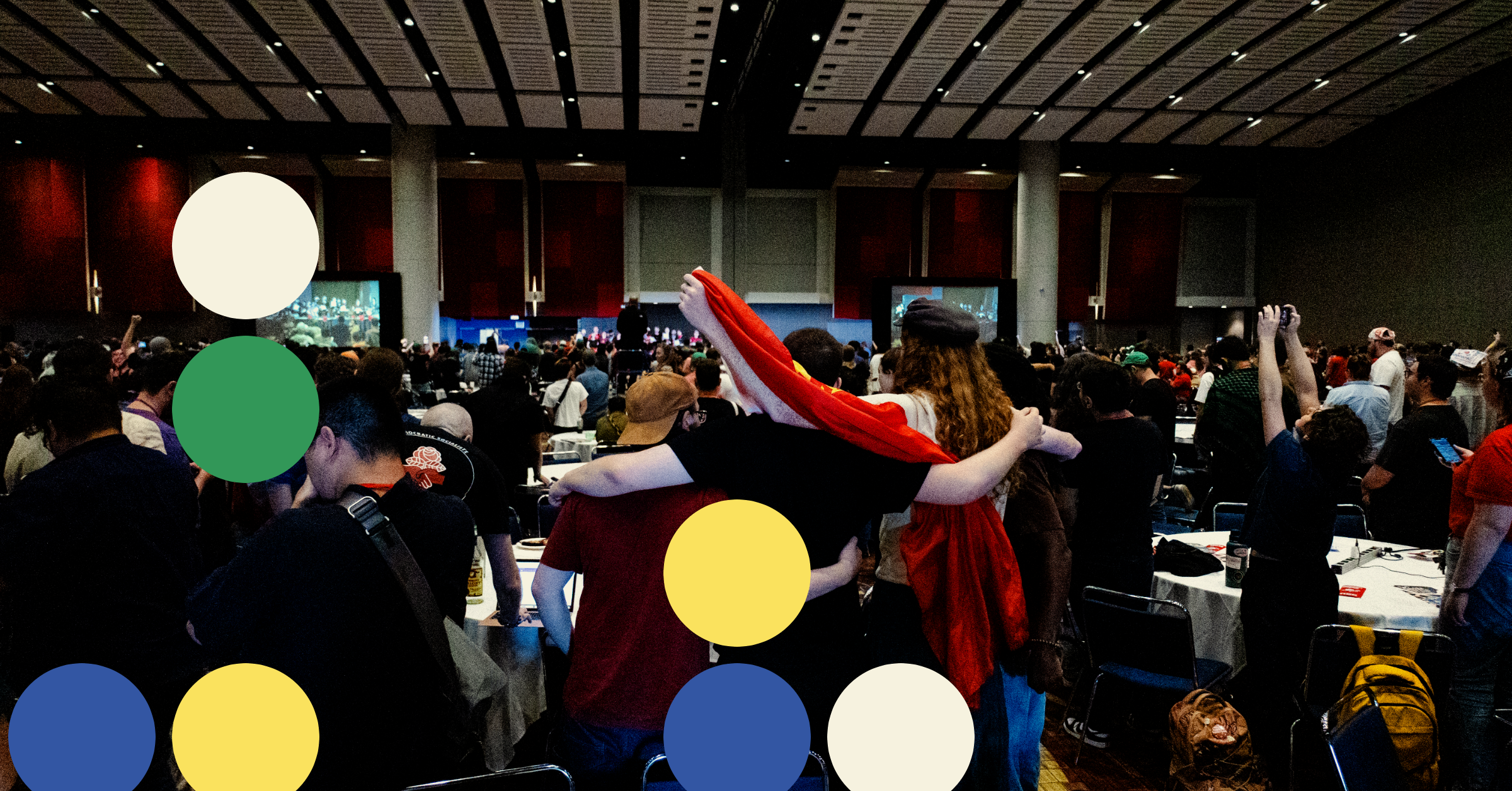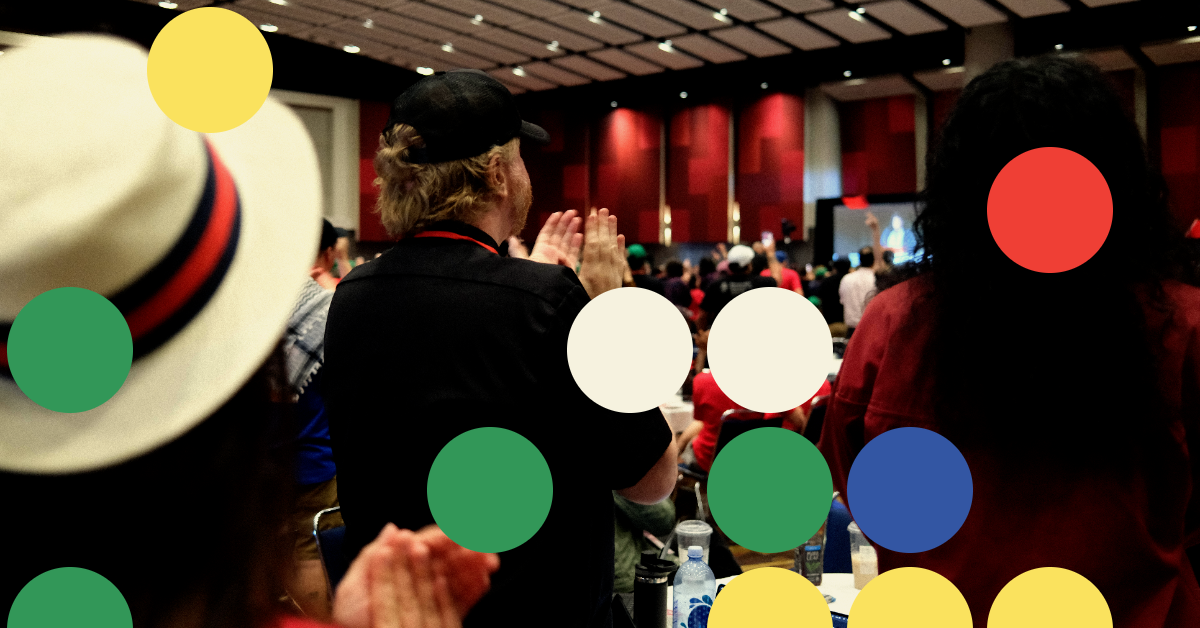Last month, the Democratic Socialists of America (DSA) launched Workers Deserve More, which outlines the concrete demands socialists in the U.S. are fighting for — an economy run by and for workers, an expansion of democratic rights, an end to the war machine, and thriving communities with access to all the basic needs of life. DSA’s new program — which all of the organized tendencies in our organization contributed to — speaks to workers’ material needs and urges social and democratic transformation led by an organized working class. “Workers Deserve More” is a stark contrast with the platforms of the Republican and Democratic parties, whose presidential campaigns are a depressing reminder that the working class isn’t represented in national politics.
Donald Trump and the Republicans are running on an authoritarian, Christian nationalist, racist platform, calling for crackdowns on political dissent, mass deportations, and the dismantling of democratic rights. Meanwhile, just like in 2016 and 2020, Kamala Harris and the Democrats are running another “anyone but Trump” campaign, deflecting on urgent economic and social issues and reversing Harris’s previous positions in order to support fully privatized healthcare, environmental destruction, and a hardline immigration policy.
There have been lots of different arguments about the presidential election from DSA’s various internal tendencies. As the election reaches its final few weeks, these arguments have crystallized into two broad approaches.
Some argue that socialists should withhold votes from the Democrats. Amy and Rashad from Marxist Unity Group (MUG) submitted a proposal, No Votes for Genocide, that would go beyond rejecting both candidates and commit DSA to organizing a campaign to convince voters not to vote for Harris unless the Biden-Harris administration ends its material support for Israel’s genocide in Gaza. We voted against the resolution, and it didn’t pass the NPC. (*See end for details of the vote.)
Another approach, taken by Socialist Majority Caucus (SMC) and Groundwork (GW), wants socialists to tactically support Kamala Harris to beat Donald Trump. Together, SMC and GW have launched Socialism Beats Fascism, an independent campaign to “grow the left and fight the right” by mobilizing socialists to campaign for Democrats in “key races and swing states.” We don’t agree with this approach, either.
We believe that neither the No Votes for Genocide campaign nor the Socialism Beats Fascism approach are right for DSA in our current context. We share the desire for socialists to lead the fight against the far right, and to use whatever power we have to fight for an end to the Gaza genocide. But what kind of intervention can we make in the presidential election to build the socialist movement and a more organized, more powerful working class?
No Votes for Genocide
The No Votes for Genocide (NVFG) resolution proposed that DSA endorse multiple state-level Uncommitted campaigns that are “calling on the public to withhold their votes from Kamala Harris unless she secures an arms embargo on Israel and an immediate and permanent ceasefire in the genocide against the people of Palestine.” Until the Biden-Harris administration makes a significant concession, the resolution would have DSA campaign for abstention in the national race.
We are similarly inclined to condemn candidates who participate in a genocide and who represent the ruling class. But while we don’t believe DSA should endorse either candidate, we also don’t think socialists should fault working-class voters for tactically supporting Harris to stop Trump. Many people have well-founded fears about a second Trump presidency, as do we. A Republican victory would attack legal protections for bodily autonomy, weaken federal regulations that make it harder for corporations to destroy our environment and our quality of life, and unravel democratic rights much more than a Democratic victory would — despite the abject failure of the Democrats to protect those policies. The second Trump administration could move swiftly to crush the fragile upsurge in the labor movement with legal repression and recessionary policies. Trump would also continue to spread hateful anti-immigrant propaganda that incites violence against people of color and undermines worker solidarity.
To be clear, the Democratic establishment is no friend of the working class and has a shameful record of its own — on immigration, war, corporate interests, labor, and many other issues. As socialists our job is to build a political alternative to that, but anything we offer will lose credibility if we paper over the consequences of a Trump presidency. Those consequences are why so many people are divided on how to feel about Harris — not just in the broader working class, but within our own organization, and even within the Palestine solidarity movement. This is especially true in the Uncommitted movement, which organized hundreds of thousands of people around the country to register protest votes in Democratic primaries. Uncommitted has been an inspiration to many who seek greater political independence from the Democrats, but the national organization has signaled an implicit endorsement of tactically voting for Harris. Without a united Uncommitted movement and support from partners such as labor unions and socialist elected officials, we are skeptical that NVFG would put new people into motion towards our politics, let alone have an effect on the US government’s policy toward Israel.
How Can Socialists Beat Fascism?
Although we didn’t support the NVFG campaign as proposed to the NPC, we believe socialists should aim to create the conditions for a similar tactic to be successful in the future. We do not believe the popular front approach of “Socialism Beats Fascism” moves us toward that goal.
The SBF website lays out three prongs to their campaign:
- Phonebanking, door-knocking, and fundraising to support down-ballot DSA campaigns.
- Promoting DSA’s Workers Deserve More program.
- Encouraging people to tactically vote against fascism [i.e., for Harris and other Democrats] in key races and swing states.
As far as we can tell, there is widespread support in DSA for the first two points. DSA won exciting primary campaigns this cycle: B&R member JP Lyninger in Louisville, KY, Laurie Sweet in Hamden, CT, Gabriel Sanchez in Georgia, and so many more across the country. We agree that it’s important in the next few months to campaign for these candidates as open champions of DSA in the general election, and we are strongly in favor of promoting DSA’s new program.
However, we must avoid liquidating ourselves into the Democratic Party every four years, a strategy that has been a disaster for the socialist and labor movements. With no powerful alternative on the left, the Democrats have felt no consequences for their turn towards neoliberal economic policies, their constant betrayal of the labor movement, and their terrible records on immigration, climate action, and Palestine.
It is also unclear how the SBF approach contributes to DSA’s goal of building an independent workers’ party, rather than putting us forever at the margins of a party that wants nothing to do with us. One part of building workers’ parties with a mass base in Europe and Latin America was the willingness of these parties to challenge liberals, even before they could realistically beat liberal or conservative parties in elections. Threats from the left often explain why liberals in these countries eventually came out in favor of working-class suffrage, national healthcare systems, and other sweeping reforms — if they didn’t, they would lose electoral ground on their left. Even in the U.S., where we lack a mass workers’ party, challenges from the left can make a real difference. Hillary Clinton and Joe Biden were forced to run on platforms much further to the left than Kamala Harris today, thanks to the effects of Bernie Sanders’s left-wing primary challenges and bottom-up pressure from Black Lives Matter, the teachers’ strike wave, and other social movements.
We do not build power by aligning our rhetoric with that of even the most left-wing elements of the Democratic Party. We build power by creating a credible alternative to the Democratic Party, one that confronts the forces of capital.
Workers Deserve More Than Harris vs. Trump
Socialists have debated this kind of dilemma for over a hundred years. Calling for a protest vote (which could mean either supporting a third party candidate or just not voting) sends the message to working people that Democrats have failed us and we should have higher expectations than the choice we are presented with every four years, especially given the Biden-Harris administration’s participation in the genocide of Palestinians. That’s what you give up when you signal tactical support for Harris. However, advocating for a protest vote implies that you would be willing to risk Trump winning the election and willing to convince people that a vote for Harris is a mistake — and it is obviously not the case that there are no meaningful distinctions between the two candidates. There is no clean solution to this contradiction.
We believe that either a protest vote or a tactical vote is a reasonable choice given our miserable options, and socialists can make the argument for political independence regardless. What makes DSA stand out is our fundamental rejection of the system that gave us these morally bankrupt candidates in the first place — regardless of how you vote — and our positive, hopeful vision for how the world should and could be instead.
While the potential mass base for either protest votes or tactical votes is a complicated question, more workers than ever are rejecting the major parties and are hungry for an alternative, even if there is no viable way to express that desire in our vote for president this year. We must fight against the potential for discouraged voters to reach reactionary and self-defeating conclusions and instead invite them into an organization that centers democracy, challenges the establishment from a left-wing, class-conscious perspective, and gives them the tools, over the long haul, to liberate themselves.
Fortunately, we already have a basis for this vision in DSA’s For Our Rights Committee (FORC) and our new Workers Deserve More program!
* At the 2024 YDSA National Convention, the YDSA version of No Votes For Genocide passed by one vote (73-72) and bound both YDSA National Co-Chairs to vote for the DSA version. On this basis, YDSA Co-Chair and B&R member Carlos Callejo III voted yes for the proposal.




